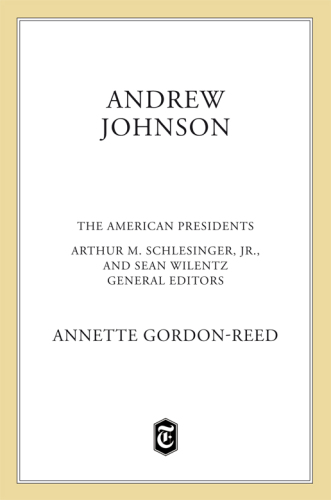
Andrew Johnson
The 17th President, 1865-1869
کتاب های مرتبط
- اطلاعات
- نقد و بررسی
- دیدگاه کاربران
نقد و بررسی

November 15, 2010
A fair-minded, toned-down portrait of a deeply problematic president who could not rise to the country's challenge after the Civil War.
While Abraham Lincoln is often considered our greatest president, the man who inherited the post after his assassination is often voted the worst. In this succinct study typical of the publisher's informative, tidily composed series, Pulitzer Prize–winning author Gordon-Reed (History and Law/Harvard Univ.; The Hemingses of Monticello) carefully walks through the conflicts of Andrew Johnson's career, culminating in his near impeachment in 1868. What compelled Johnson to block all measures of Reconstruction in the South and rehabilitate the very Southern planters and slave-owners who had earlier wrecked the Union? The author considers the measure of Johnson's character, forged in the years of his family's poverty after the early death of his father in Raleigh, N.C. Forced by his mother's reduced circumstances into apprenticeship to a tailor, Johnson escaped and eventually set up shop as a tailor in Greenville, Tenn., married and grew somewhat prosperous, despite the lack of any formal education. It was during those early years, when he had "brushed up close to the nightmare of dependency and social degradation," a state shared by the enslaved African Americans at the time, that Johnson developed his obsession with the wrongs of the poor whites at the hands of the planter class—and at the expense of blacks. A fiery debater, Johnson duly acceded to positions of alderman, mayor, congressman, governor and senator as a Tennessee Democrat. A staunch Unionist (despite his pro-slavery stance) and proponent of the Homestead Act, Johnson also made a lot of enemies. His ability to serve as a military governor (appointed by Lincoln) to a state in rebellion from the Union underscored his character's ample contradictions, foretelling the executive trials ahead.
Gordon-Reed incorporates views by Johnson's other biographers to create a fleshed-out, many-sided portrait.
(COPYRIGHT (2010) KIRKUS REVIEWS/NIELSEN BUSINESS MEDIA, INC. ALL RIGHTS RESERVED.)

February 1, 2011
Andrew Johnson rose from humble beginnings in the South to serve as Lincoln's second vice president, thus becoming President just as the Civil War was ending. He showed none of his predecessor's political finesse and is often viewed as among the worst to hold the office. In this short and brilliantly written book, award-winning author Gordon-Reed (law & history, Harvard Univ.; The Hemingses of Monticello) argues that the nation went from the best President to the worst during this most crucial period of its history. This slim study does cover Johnson from birth to death (1808-75), but the focus is assuredly on his presidency. Gordon-Reed does not seek to improve Johnson's reputation but to analyze it. She argues that his racism and deep insecurity were central to his failure to work with Congress to craft a workable Reconstruction at war's end. VERDICT This concise, well-documented, and accessible book is recommended for all college and public libraries.--Theresa McDevitt, Indiana Univ. of Pennsylvania Lib.
Copyright 2011 Library Journal, LLC Used with permission.

Starred review from December 1, 2010
Andrew Johnson, the seventeenth man to ascend to the highest office in the land, is generally regarded by historians as among the weakest presidents. Gordon-Reed has no intention of moving Johnson up in rank (America went from the best to the worst in one presidential term, she corroborates). So this is no reputation rescue. Gordon-Reed, author of The Hemingses of Monticello: An American Family (2008), which won the Pulitzer Prize and the National Book Award, takes as her task explaining why we should look anew at such a disastrous chief executive. She reasons he is worth looking at, though her reasoning yields a far from sympathetic look. In a short biography, all bases can be covered, but the author is still left to exercise the tone of a personal essay, which this author accomplishes brilliantly. Her personal take on Johnson is that his inability to remake the country after it was torn apart rested on his deplorable view of black Americans. In practical terms, his failure derived from his stubborn refusal to compromise with Congress in the abiding post-Lincoln controversy over who was to supervise the Reconstruction, the executive or the legislative branch. A failure, yes, but more than that, a failure at an extremely critical time in American history.(Reprinted with permission of Booklist, copyright 2010, American Library Association.)

























دیدگاه کاربران